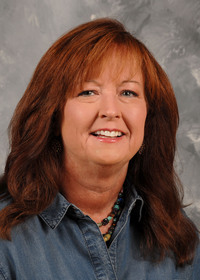Information Possibly Outdated
The information presented on this page was originally released on February 11, 2002. It may not be outdated, but please search our site for more current information. If you plan to quote or reference this information in a publication, please check with the Extension specialist or author before proceeding.
Therapeutic riding is gaining strength
By Linda Breazeale
MISSISSIPPI STATE -- Therapeutic riding is gaining in popularity with therapists, community volunteers and among people with disabilities.
"The primary focus of therapeutic riding is to foster independence for people with special needs. As the interest in enabling people to be more independent grows, so does therapeutic riding," said Mary Ford, 4-H therapeutic riding instructor with Mississippi State University's Extension Service.
"Therapeutic riding helps clients improve their dynamic posture and balance as well as sensory processing and functional mobility," Ford said.
The patient sits on the horse and reacts to the movement of the horse as people walking alongside assist. Mississippi has had four active centers located in Starkville, Vicksburg, Jackson and Kiln; two more have just opened in Senatobia and Tupelo. Two additional centers are scheduled to open soon in Oxford and Caledonia.
"Volunteers are the backbone of a therapeutic riding program. The ratio is three volunteers to one rider," Ford said. "Training is very important for the safety of the riders, volunteers and horses. Volunteers learn about disabilities and the importance of inclusion in our society."
Ford organizes the MSU Extension Service 4-H TEAM riding sessions, which stands for Therapeutic Equine Activity Member. The second year of classes will begin in March at the Mississippi Horse Park, south of Starkville.
"Our goal is to be a demonstration project for people who are interested in starting a therapeutic riding center somewhere else in the state," Ford said. "We are affiliated with the North American Riding for the Handicapped Association and are working toward accreditation. NARHA emphasizes consistent safety standards for the rider, volunteer and horse."
While operating a center requires significant effort, there are helpful resources available through NARHA and other existing centers.
"Anyone with a remote interest in therapeutic riding should visit a center and observe. They would see it's not just the riders who benefit; the volunteers get something out of it, too," Ford said. "People who manage centers are those who want to enable people with special needs to find independence. Some managers are therapists, special education teachers, parents of children with disabilities or horse enthusiasts."
Therapeutic riding classes through the MSU Extension Service 4-H TEAM program will take place each Tuesday morning from March 19 until May 14. Volunteer training is scheduled from 9 a.m. until noon on March 5. For more information, contact Ford at (662) 325-1695 or by e-mail at maryf@ext.msstate.edu.
Released: Feb. 11, 2002
For more information, contact: Mary Ford, (662) 325-1695


